#adolf brand
Text

Illustration by Felix Willmann
Paul Vois, "Einem toten Freunde", in Adolf Brand (ed.), Der Eigene (April 1905)
Universitätsbibliothek der Humboldt-Universität zu Berlin
24 notes
·
View notes
Text
Couch surfer in his 30s. Oscar winner in his 40s. Why the whole world wants Taika
**Notes: This is very long post!**
Good Weekend
In his 30s, he was sleeping on couches. By his 40s, he’d directed a Kiwi classic, taken a Marvel movie to billion-dollar success, and won an Oscar. Meet Taika Waititi, king of the oddball – and one of New Zealand’s most original creative exports.
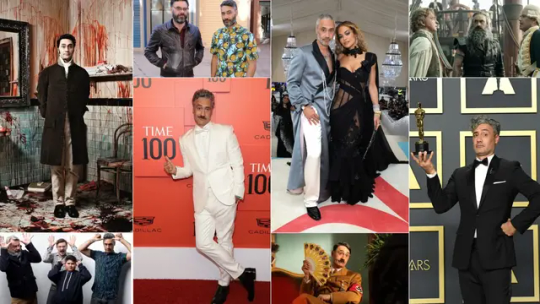
Taika Waititi: “Be a nice person and live a good life. And just don’t be an arsehole.”
The good news? Taika Waititi is still alive. I wasn’t sure. The screen we were speaking through jolted savagely a few minutes ago, with a cacophonous bang and a confused yelp, then radio silence. Now the Kiwi filmmaker is back, grinning like a loon: “I just broke the f---ing table, bro!”
Come again? “I just smashed this f---ing table and glass flew everywhere. It’s one of those old annoying colonial tables. It goes like this – see that?” Waititi says, holding up a folding furniture leg. “I hit the mechanism and it wasn’t locked. Anyway …”
I’m glad he’s fine. The stuff he’s been saying from his London hotel room could incur biblical wrath. We’re talking about his latest project, Next Goal Wins, a movie about the American Samoa soccer team’s quest to score a solitary goal, 10 years after suffering the worst loss in the game’s international history – a 31-0 ignominy to Australia – but our chat strays into spirituality, then faith, then religion.
“I don’t personally believe in a big guy sitting on a cloud judging everyone, but that’s just me,” Waititi says, deadpan. “Because I’m a grown-up.”
This is the way his interview answers often unfold. Waititi addresses your topic – dogma turns good people bad, he says, yet belief itself is worth lauding – but bookends every response with a conspiratorial nudge, wink, joke or poke. “Regardless of whether it’s some guy living on a cloud, or some other deity that you’ve made up – and they’re all made up – the message across the board is the same, and it’s important: Be a nice person, and live a good life. And just don’t be an arsehole!”
Not being an arsehole seems to have served Waititi, 48, well. Once a national treasure and indie darling (through the quirky tenderness of his breakout New Zealand films Boy in 2010 and Hunt for the Wilderpeople in 2016), Waititi then became a star of both the global box office (through his 2017 entry into the Marvel Universe, Thor: Ragnarok, which grossed more than $1.3 billion worldwide) and then the Academy Awards (winning the 2020 best adapted screenplay Oscar for his subversive Holocaust dramedy JoJo Rabbit, in which he played an imaginary Hitler).
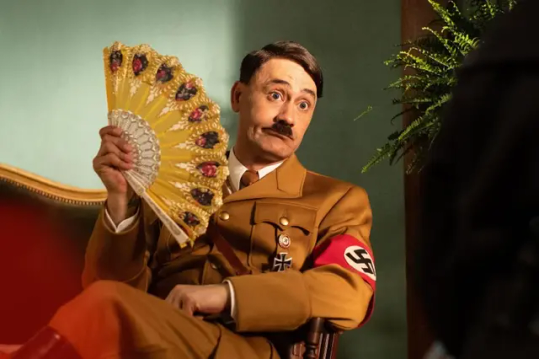
Waititi playing Adolf Hitler in the 2019 movie JoJo Rabbit. (Alamy)
A handsome devil with undeniable roguish charm, Waititi also slid seamlessly into style-icon status (attending this year’s Met Gala shirtless, in a floor-length gunmetal-grey Atelier Prabal Gurung wrap coat, with pendulous pearl necklaces), as well as becoming his own brand (releasing an eponymous line of canned coffee drinks) and bona fide Hollywood A-lister (he was introduced to his second wife, British singer Rita Ora, by actor Robert Pattinson at a barbecue).
Putting that platform to use, Waititi is an Indigenous pioneer and mentor, too, co-creating the critically acclaimed TV series Reservation Dogs, while co-founding the Piki Films production company, committed to promoting the next generation of storytellers – a mission that might sound all weighty and worthy, yet Waititi’s new wave of First Nations work is never earnest,
always mixing hurt with heart and howling humour.
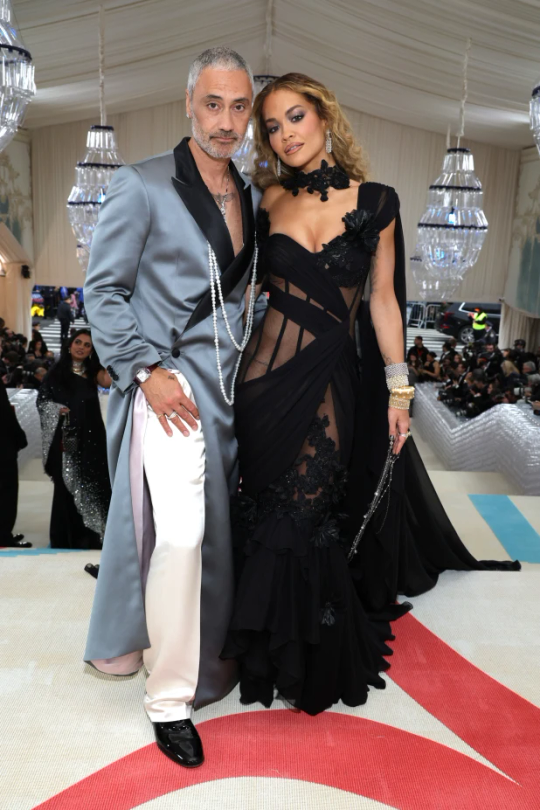
Waititi with wife Rita Ora at the 2023 Met Gala in May. (Getty Images)
Makes sense. Waititi is a byproduct of “the weirdest coupling ever” – his late Maori father from the Te Whanau-a-Apanui tribe was an artist, farmer and “Satan’s Slaves” bikie gang founder, while his Wellington schoolteacher mum descended from Russian Jews, although he’s not devout about her faith. (“No, I don’t practise,” he confirms. “I’m just good at everything, straight away.”)
He’s remained loyally tethered to his origin story, too – and to a cadre of creative Kiwi mates, including actors Jemaine Clement and Rhys Darby – never forgetting that not long before the actor/writer/producer/director was an industry maven, he was a penniless painter/photographer/ musician/comedian.
With no set title and no fixed address, he’s seemingly happy to be everything, everywhere (to everyone) all at once. “‘The universe’ is bandied around a lot these days, but I do believe in the kind of connective tissue of the universe, and the energy that – scientifically – we are made up of a bunch of atoms that are bouncing around off each other, and some of the atoms are just squished together a bit tighter than others,” he says, smiling. “We’re all made of the same stardust, and that’s pretty special.”
-----------------------------------------------
We’ve caught Waititi in a somewhat relaxed moment, right before the screen actors’ and media artists’ strike ends. He’s sensitive to the struggle but doesn’t deny enjoying the break. “I spent a lot of time thinking about writing, and not writing, and having a nice holiday,” he tells Good Weekend. “Honestly, it was a good chance just to recombobulate.”
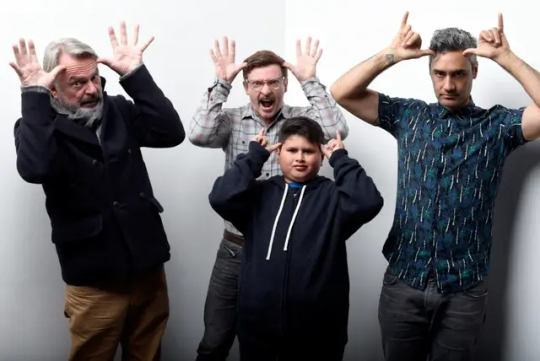
Waititi, at right, with Hunt for the Wilderpeople actors, from left, Sam Neill, Rhys Darby and Julian Dennison. (Getty Images)
It’s mid-October, and he’s just headed to Paris to watch his beloved All Blacks in the Rugby World Cup. He’s deeply obsessed with the game, and sport in general. “Humans spend all of our time knowing what’s going to happen with our day. There’s no surprises any more. We’ve become quite stagnant. And I think that’s why people love sport, because of the air of unpredictability,” he says. “It’s the last great arena entertainment.”
The main filmic touchstone for Next Goal Wins (which premieres in Australian cinemas on New Year’s Day) would be Cool Runnings (1993), the unlikely true story of a Jamaican bobsled team, but Waititi also draws from genre classics such as Any Given Sunday and Rocky, sampling trusted tropes like the musical training montage. (His best one is set to Everybody Wants to Rule the World by Tears for Fears.)
Filming in Hawaii was an uplifting experience for the self-described Polynesian Jew. “It wasn’t about death, or people being cruel to each other. Thematically, it was this simple idea, of getting a small win, and winning the game wasn’t even their goal – their goal was to get a goal,” he says. “It was a really sweet backbone.”
Waititi understands this because, growing up, he was as much an athlete as a nerd, fooling around with softball and soccer before discovering rugby league, then union. “There’s something about doing exercise when you don’t know you’re doing exercise,” he enthuses. “It’s all about the fun of throwing a ball around and trying to achieve something together.” (Whenever Waititi is in Auckland he joins his mates in a long-running weekend game of touch rugby. “And then throughout the week I work out every day. Obviously. I mean, look at me.”)
Auckland is where his kids live, too, so he spends as much time there as possible. Waititi met his first wife, producer Chelsea Winstanley, on the set of Boy in 2010, and they had two daughters, Matewa Kiritapu, 8, and his firstborn, Te Kainga O’Te Hinekahu, 11. (The latter is a derivative of his grandmother’s name, but he jokes with American friends that it means “Resurrection of Tupac” or “Mazda RX7″) Waititi and Winstanley split in about 2018, and he married the pop star Ora in 2022.
He offers a novel method for balancing work with parenthood … “Look, you just abandon them, and know that the experience will make them harder individuals later on in life. And it’s their problem,” he says. “I’m going to give them all of the things that they need, and I’m going to leave behind a decent bank account for their therapy, and they will be just like me, and the cycle will continue.”
Jokes aside – I think he’s joking – school holidays are always his, and he brings the girls onto the set of every movie he makes. “They know enough not to get in the way or touch anything that looks like it could kill you, and they know to be respectful and quiet when they need to. But they’re just very comfortable around filmmakers, which I’m really happy about, because eventually I hope they will get into the industry. One more year,” he laughs, “then they can leave school and come work for Dad.”
Theirs is certainly a different childhood than his. Growing up, he was a product of two worlds. His given names, for instance, were based on his appearance at birth: “Taika David” if he looked Maori (after his Maori grandfather) and “David Taika” if he looked Pakeha (after his white grandfather). His parents split when he was five, so he bounced between his dad’s place in Waihau Bay, where he went by the surname Waititi, and his mum, eight hours drive away in Wellington, where he went by Cohen (the last name on his birth certificate and passport).
Waititi was precocious, even charismatic. His mother Robin once told Radio New Zealand that people always wanted to know him, even as an infant: “I’d be on a bus with him, and he was that kind of baby who smiled at people, and next thing you know they’re saying, ‘Can I hold your baby?’ He’s always been a charmer to the public eye.”
He describes himself as a cool, sporty, good-looking nerd, raised on whatever pop culture screened on the two TV channels New Zealand offered in the early 1980s, from M*A*S*H and Taxi to Eddie Murphy and Michael Jackson. He was well-read, too. When punished by his mum, he would likely be forced to analyse a set of William Blake poems.
He puts on a whimpering voice to describe their finances – “We didn’t have much monneeey” – explaining how his mum spent her days in the classroom but also worked in pubs, where he would sit sipping a raspberry lemonade, doodling drawings and writing stories. She took in ironing and cleaned houses; he would help out, learning valuable lessons he imparts to his kids. “And to random people who come to my house,” he says. “I’ll say, ‘Here’s a novel idea, wash this dish,’ but people don’t know how to do anything these days.”
“Every single character I’ve ever written has been based on someone I’ve known or met or a story I’ve stolen from someone.” - Taika Waititi
He loved entertaining others, clearly, but also himself, recording little improvised radio plays on a tape deck – his own offbeat versions of ET and Indiana Jones and Star Wars. “Great free stuff where you don’t have any idea what the story is as you’re doing it,” he says. “You’re just sort of making it up and enjoying the freedom of playing god in this world where you can make people and characters do whatever you want.”
His other sphere of influence lay in Raukokore, the tiny town where his father lived. Although Boy is not autobiographical, it’s deeply personal insofar as it’s filmed in the house where he grew up, and where he lived a life similar to that portrayed in the story, surrounded by his recurring archetypes: warm grandmothers and worldly kids; staunch, stoic mums; and silly, stunted men. “Every single character I’ve ever written has been based on someone I’ve known or met,” he says, “or a story I’ve stolen from someone.”
He grew to love drawing and painting, obsessed early on with reproducing the Sistine Chapel. During a 2011 TED Talk on creativity, Waititi describes his odd subject matter, from swastikas and fawns to a picture of an old lady going for a walk … upon a sword … with Robocop. “My father was an outsider artist, even though he wouldn’t know what that meant,” Waititi told the audience in Doha. “I love the naive. I love people who can see things through an innocent viewpoint. It’s inspiring.”
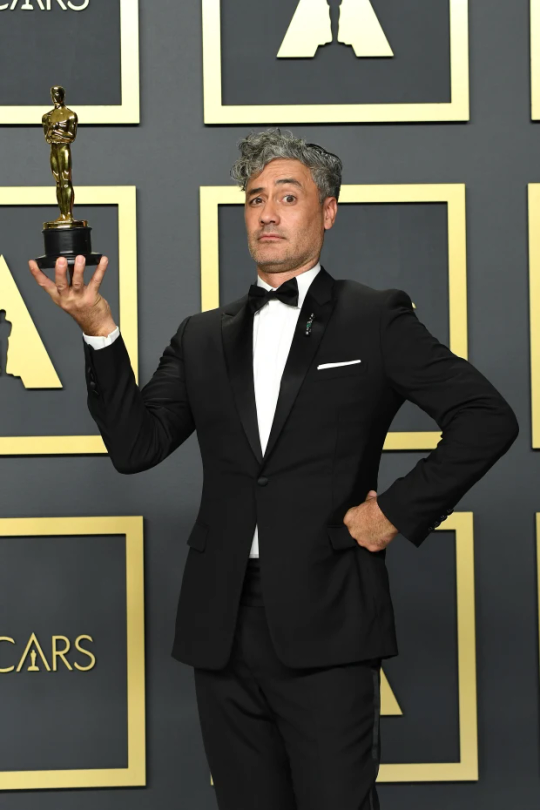
After winning Best Adapted Screenplay Academy Award for JoJo Rabbit in 2020. (Getty Images)
It was an interesting time in New Zealand, too – a coming-of-age decade in which the Maori were rediscovering their culture. His area was poor, “but only financially,” he says. “It’s very rich in terms of the people and the culture.” He learned kapa haka – the songs, dances and chants performed by competing tribes at cultural events, or to honour people at funerals and graduations – weddings, parties, anything. “Man, any excuse,” he explains. “A big part of doing them is to uplift your spirits.”
Photography was a passion, so I ask what he shot. “Just my penis. I sent them to people, but we didn’t have phones, so I would print them out, post them. One of the first dick pics,” he says. Actually, his lens was trained on regular people. He watches us still – in airports, restaurants. “Other times late at night, from a tree. Whatever it takes to get the story. You know that.”
He went to the Wellington state school Onslow College and did plays like Androcles and the Lion, A Midsummer Night’s Dream and The Crucible. His crew of arty students eventually ended up on stage at Bats Theatre in the city, where they would perform haphazard comedy shows for years.
“Taika was always rebellious and wild in his comedy, which I loved,” says his high school mate Jackie van Beek, who became a longtime collaborator, including working with Waititi on a Tourism New Zealand campaign this year. “I remember he went through a phase of turning up in bars around town wearing wigs, and you’d try and sit down and have a drink with him but he’d be doing some weird character that would invariably turn up in some show down the track.”
He met more like-minded peers at Victoria University, including Jemaine Clement (who’d later become co-creator of Flight of the Conchords). During a 2019 chat with actor Elijah Wood, Waititi describes he and Clement clocking one another from opposite sides of the library one day: a pair of Maoris experiencing hate at first sight, based on a mutual suspicion of cultural appropriation. (Clement was wearing a traditional tapa cloth Samoan shirt, and Waititi was like: “This motherf---er’s not Samoan.” Meanwhile, Waititi was wearing a Rastafarian beanie, and Clement was like, “This motherf---er’s not Jamaican.”)
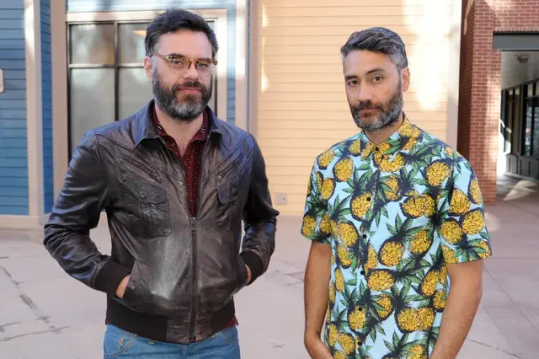
With Jemaine Clement in 2014. (Getty Images)
But they eventually bonded over Blackadder and Fawlty Towers, and especially Kenny Everett, and did comedy shows together everywhere from Edinburgh to Melbourne. Waititi was almost itinerant, spending months at a time busking, or living in a commune in Berlin. He acted in a few small films, and then – while playing a stripper on a bad TV show – realised he wanted to try life behind the camera. “I became tired of being told what to do and ordered around,” he told Wellington’s Dominion Post in 2004. “I remember sitting around in the green room in my G-string thinking, ‘Why am I doing this? Just helping someone else to realise their dream.’ ”
He did two strong short films, then directed his first feature – Eagle vs Shark (2007) – when he was 32. He brought his mates along (Clement, starring with Waititi’s then-girlfriend Loren Horsley), setting something of a pattern in his career: hiring friends instead of constantly navigating new working relationships. “If you look at things I’m doing,” he tells me, “there’s always a few common denominators.”
Sam Neill says Waititi is the exemplar of a new New Zealand humour. “The basis of it is this: we’re just a little bit crap at things.”
This gang of collaborators shares a common Kiwi vibe, too, which his longtime friend, actor Rhys Darby, once coined “the comedy of the mundane”. Their new TV show, Our Flag Means Death, for example, leans heavily into the mundanity of pirate life – what happens on those long days at sea when the crew aren’t unsheathing swords from scabbards or burying treasure.
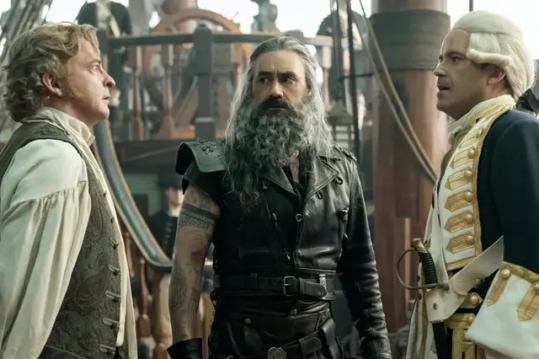
Waititi plays pirate captain Blackbeard, centre, in Our Flag Means Death, with Rhys Darby, left, and Rory Kinnear. (Google Images)
Sam Neill, who first met Waititi when starring in Hunt for the Wilderpeople, says Waititi is the exemplar of a new New Zealand humour. “And I think the basis of it is this,” says Neill. “We’re just a little bit crap at things, and that in itself is funny.” After all, Neill asks, what is What We Do in The Shadows (2014) if not a film (then later a TV show) about a bunch of vampires who are pretty crap at being vampires, living in a pretty crappy house, not quite getting busted by crappy local cops? “New Zealand often gets named as the least corrupt country in the world, and I think it’s just that we would be pretty crap at being corrupt,” Neill says. “We don’t have the capacity for it.”
Waititi’s whimsy also spurns the dominant on-screen oeuvre of his homeland – the so-called “cinema of unease” exemplified by the brutality of Once Were Warriors (1994) and the emotional peril of The Piano (1993). Waititi still explores pathos and pain, but through laughter and weirdness. “Taika feels to me like an antidote to that dark aspect, and a gift somehow,” Neill says. “And I’m grateful for that.”
-----------------------------------------------
Something happened to Taika Waititi when he was about 11 – something he doesn’t go into with Good Weekend, but which he considered a betrayal by the adults in his life. He mentioned it only recently – not the moment itself, but the lesson he learnt: “That you cannot and must not rely on grown-ups to help you – you’re basically in the world alone, and you’re gonna die alone, and you’ve just gotta make it all for yourself,” he told Irish podcast host James Brown. “I basically never forgave people in positions of responsibility.”
What does that mean in his work? First, his finest films tend to reflect the clarity of mind possessed by children, and the unseen worlds they create – fantasies conjured up as a way to understand or overcome. (His mum once summed up the main message of Boy: “The unconditional love you get from your children, and how many of us waste that, and don’t know what we’ve got.”)
Second, he’s suited to movie-making – “Russian roulette with art” – because he’s drawn to disruptive force and chaos. And that in turn produces creative defiance: allowing him to reinvigorate the Marvel Universe by making superheroes fallible, or tell a Holocaust story by making fun of Hitler. “Whenever I have to deal with someone who’s a boss, or in charge, I challenge them,” he told Brown, “and I really do take whatever they say with a pinch of salt.”
It’s no surprise then that Waititi was comfortable leaping from independent films to the vast complexity of Hollywood blockbusters. He loves the challenge of coordinating a thousand interlocking parts, requiring an army of experts in vocations as diverse as construction, sound, art, performance and logistics. “I delegate a lot,” he says, “and share the load with a lot of people.”
“This is a cool concept, being able to afford whatever I want, as opposed to sleeping on couches until I was 35.” - Taika Waititi
But the buck stops with him. Time magazine named Waititi one of its Most Influential 100 People of 2022. “You can tell that a film was made by Taika Waititi the same way you can tell a piece was painted by Picasso,” wrote Sacha Baron Cohen. Compassionate but comic. Satirical but watchable. Rockstar but auteur. “Actually, sorry, but this guy’s really starting to piss me off,” Cohen concluded. “Can someone else write this piece?”

Directing Chris Hemsworth in 2017 in Thor: Ragnarok, which grossed more than $1.3 billion at the box office. (Alamy)
I’m curious to know how he stays grounded amid such adulation. Coming into the game late, he says, helped immensely. After all, Waititi was 40 by the time he left New Zealand to do Thor: Ragnarok. “If you let things go to your head, then it means you’ve struggled to find out who you are,” he says. “But I’ve always felt very comfortable with who I am.” Hollywood access and acclaim – and the pay cheques – don’t erase memories of poverty, either. “It’s more like, ‘Oh, this is a cool concept, being able to afford whatever I want, as opposed to sleeping on couches until I was 35.’ ” Small towns and strong tribes keep him in check, too. “You know you can’t piss around and be a fool, because you’re going to embarrass your family,” he says. “Hasn’t stopped me, though.”
Sam Neill says there was never any doubt Waititi would be able to steer a major movie with energy and imagination. “It’s no accident that the whole world wants Taika,” he says. “But his seductiveness comes with its own dangers. You can spread yourself a bit thin. The temptation will be to do more, more, more. That’ll be interesting to watch.”
Indeed, I find myself vicariously stressed out over the list of potential projects in Waititi’s future. A Roald Dahl animated series for Netflix. An Apple TV show based on the 1981 film Time Bandits. A sequel to What We Do In The Shadows. A reboot of Flash Gordon. A gonzo horror comedy, The Auteur, starring Jude Law. Adapting a cult graphic novel, The Incal, as a feature. A streaming series based on the novel Interior Chinatown. A film based on a Kazuo Ishiguro bestseller. Plus bringing to life the wildly popular Akira comic books. Oh, and for good measure, a new instalment of Star Wars, which he’s already warned the world will be … different.
“It’s going to change things,” he told Good Morning America. “It’s going to change what you guys know and expect.”
Did I say I was stressed for Waititi? I meant physically sick.
“Well…” he qualifies, “some of those things I’m just producing, so I come up with an idea or someone comes to me with an idea, and I shape how ‘it’s this kind of show’ and ‘here’s how we can get it made.’ It’s easier for me to have a part in those things and feel like I’ve had a meaningful role in the creative process, but also not having to do what I’ve always done, which is trying to control everything.”
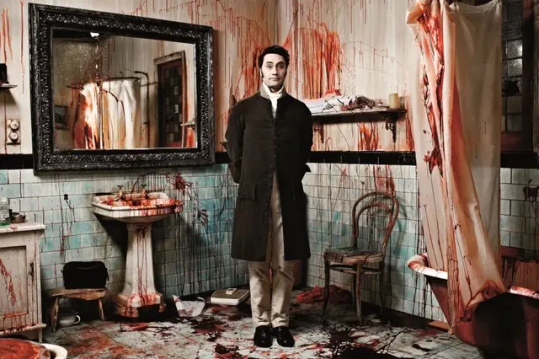
In the 2014 mockumentary horror film What We Do in the Shadows, which he co-directed with Jemaine Clement. (Alamy)
What about moving away from the niche New Zealand settings he represented so well in his early work? How does he stay connected to his roots? “I think you just need to know where you’re from,” he says, “and just don’t forget that.”
They certainly haven’t forgotten him.
Jasmin McSweeney sits in her office at the New Zealand Film Commission in Wellington, surrounded by promotional posters Waititi signed for her two decades ago, when she was tasked with promoting his nascent talent. Now the organisation’s marketing chief, she talks to me after visiting the heart of thriving “Wellywood”, overseeing the traditional karakia prayer on the set of a new movie starring Geoffrey Rush.
Waititi isn’t the first great Kiwi filmmaker – dual Oscar-winner Jane Campion and blockbuster king Peter Jackson come to mind – yet his particular ascendance, she says, has spurred unparalleled enthusiasm. “Taika gave everyone here confidence. He always says, ‘Don’t sit around waiting for people to say, you can do this.’ Just do it, because he just did it. That’s the Taika effect.”
-----------------------------------------------
Taika David Waititi is known for wearing everything from technicolour dreamcoats to pineapple print rompers, and today he’s wearing a roomy teal and white Isabel Marant jumper. The mohair garment has the same wispy frizz as his hair, which curls like a wave of grey steel wool, and connects with a shorn salty beard.
A stylish silver fox, it wouldn’t surprise anyone if he suddenly announced he was launching a fashion label. He’s definitely a commercial animal, to the point of directing television commercials for Coke and Amazon, along with a fabulous 2023 spot for Belvedere vodka starring Daniel Craig. He also joined forces with a beverage company in Finland (where “taika” means “magic”) to release his coffee drinks. Announcing the partnership on social media, he flagged that he would be doing more of this kind of stuff, too (“Soz not soz”).
Waititi has long been sick of reverent portrayals of Indigenous people talking to spirits.
There’s substance behind the swank. Fashion is a creative outlet but he’s also bought sewing machines in the past with the intention of designing and making clothes, and comes from a family of tailors. “I learnt how to sew a button on when I was very young,” he says. “I learnt how to fix holes or patches in your clothes, and darn things.”
And while he gallivants around the globe watching Wimbledon or modelling for Hermès at New York Fashion Week, all that glamour belies a depth of purpose, particularly when it comes to Indigenous representation.
There’s a moment in his new movie where a Samoan player realises that their Dutch coach, played by Michael Fassbender, is emotionally struggling, and he offers a lament for white people: “They need us.” I can’t help but think Waititi meant something more by that line – maybe that First Nations people have wisdom to offer if others will just listen?
“Weeelllll, a little bit …” he says – but from his intonation, and what he says next, I’m dead wrong. Waititi has long been sick of reverent portrayals of Indigenous people talking to kehua (spirits), or riding a ghost waka (phantom canoe), or playing a flute on a mountain. “Always the boring characters,” he says. “They’ve got no real contemporary relationship with the world, because they’re always living in the past in their spiritual ways.”

A scene from Next Goal Wins, filmed earlier this year. (Alamy)
He’s part of a vanguard consciously poking fun at those stereotypes. Another is the Navajo writer and director Billy Luther, who met Waititi at Sundance Film Festival back in 2003, along with Reservation Dogs co-creator Sterlin Harjo. “We were this group of outsiders trying to make films, when nobody was really biting,” says Luther. “It was a different time. The really cool thing about it now is we’re all working. We persevered. We didn’t give up. We slept on each other’s couches and hung out. It’s like family.”
Waititi has power now, and is known for using Indigenous interns wherever possible (“because there weren’t those opportunities when I was growing up”), making important introductions, offering feedback on scripts, and lending his name to projects through executive producer credits, too, which he did for Luther’s new feature film, Frybread Face and Me (2023).
He called Luther back from the set of Thor: Love and Thunder (2022) to offer advice on working with child actors – “Don’t box them into the characters you’ve created,” he said, “let them naturally figure it out on their own” – but it’s definitely harder to get Waititi on the phone these days. “He’s a little bitch,” Luther says, laughing. “Nah, there’s nothing like him. He’s a genius. You just knew he was going to be something. I just knew it. He’s my brother.“
I’ve been asked to explicitly avoid political questions in this interview, probably because Waititi tends to back so many causes, from child poverty and teenage suicide to a campaign protesting offshore gas and oil exploration near his tribal lands. But it’s hard to ignore his recent Instagram post, sharing a viral video about the Voice to Parliament referendum starring Indigenous Aussie rapper Adam Briggs. After all, we speak only two days after the proposal is defeated. “Yeah, sad to say but, Australia, you really shat the bed on that one,” Waititi says, pausing. “But go see my movie!”
About that movie – the early reviews aren’t great. IndieWire called it a misfire, too wrapped in its quirks to develop its arcs, with Waititi’s directorial voice drowning out his characters, while The Guardian called it “a shoddily made and strikingly unfunny attempt to tell an interesting story in an uninteresting way”. I want to know how he moves past that kind of criticism. “For a start, I never read reviews,” he says, concerned only with the opinion of people who paid for admission, never professional appraisals. “It’s not important to me. I know I’m good at what I do.”
Criticism that Indigenous concepts weren’t sufficiently explained in Next Goal Wins gets his back up a little, though. The film’s protagonist, Jaiyah Saelua, the first transgender football player in a FIFA World Cup qualifying match, is fa’afafine – an American Samoan identifier for someone with fluid genders – but there wasn’t much exposition of this concept in the film. “That’s not my job,” Waititi says. “It’s not a movie where I have to explain every facet of Samoan culture to an audience. Our job is to retain our culture, and present a story that’s inherently Polynesian, and if you don’t like it, you can go and watch any number of those other movies out there, 99 per cent of which are terrible.”
*notes: (there is video clip in the article)
Waititi sounds momentarily cranky, but he’s mostly unflappable and hilarious. He’s the kind of guy who prefers “Correctumundo bro!” to “Yes”. When our video connection is too laggy, he plays up to it by periodically pretending to be frozen, sitting perfectly still, mouth open, his big shifting eyeballs the only giveaway.
He’s at his best on set. Saelua sat next to him in Honolulu while filming the joyous soccer sequences. “He’s so chill. He just let the actors do their thing, giving them creative freedom, barely interjecting unless it was something important. His style matches the vibe of the Pacific people. We’re a very funny people. We like to laugh. He just fit perfectly.”
People do seem to love working alongside him, citing his ability to make productions fresh and unpredictable and funny. Chris Hemsworth once said that Waititi’s favourite gag is to “forget” that his microphone is switched on, so he can go on a pantomime rant for all to hear – usually about his disastrous Australian lead actor – only to “remember” that he’s wired and the whole crew is listening.
“I wouldn’t know about that, because I don’t listen to what other people say about anything – I’ve told you this,” Waititi says. “I just try to have fun when there’s time to have fun. And when you do that, and you bring people together, they’re more willing to go the extra mile for you, and they’re more willing to believe in the thing that you’re trying to do.”
Yes, he plays music between takes, and dances out of his director’s chair, but it’s really all about relaxing amid the immense pressure and intense privilege of making movies. “Do you know how hard it is just to get anything financed or green-lit, then getting a crew, getting producers to put all the pieces together, and then making it to set?” Waititi asks. “It’s a real gift, even to be working, and I feel like I have to remind people of that: enjoy this moment.”
Source: The Age
By: Konrad Marshall (December 1, 2023)
194 notes
·
View notes
Text
DD Endorsement Birthday Wishes





Messages under the cut:
Redmi:
Growth is a transformation again and again, defeating the previous self
To grow up is to be full of love and face the next journey
Congratulations to the global spokesperson of the Redmi mobile phone brand Wang Yibo
Happy 26th birthday! A warm summer, love more than a summer 💚
SuperX:
Happy 🎂 26th birthday to Wang Yibo!
I hope that at the age of 26, you still dare to challenge, persevere, and always be passionate about love❗
Adolph Personal Care:
All along, you have strictly demanded yourself with extremely high standards, went all out, made your love to the extreme, proved yourself with your strength, and passed on positive energy to every audience who supports you with your own strength. This year, it is a great honor for Adolf to cooperate with you to pass on the taste of love to more people, to let more people know the high-quality domestic products, and to turn on the lights at night when the sun goes down. This light of Adolf is on for you. I wish Wang Yibo Happy 26th birthday, your brilliance is unique, may you always be pure, free, healthy and happy. 💚
Master Kong Iced Tea:
❗️A passionate young man with hot dreams and never giving up❗️
❗️It is Cool Guy who sticks to the original intention, fearless and pure attitude❗️
🎉Enthusiastic life, now showing 🎉 Happy Birthday to the spokesperson of Master Kong Iced Tea brand Wang Yibo 🎂 May we live up to our love and become the exclamation point of our own lives❗️
Lowen Beer:
Warm, free, brave, firm…
May you continue to move forward in the world you love, and the script of life in the new year will be more exciting,
On the road to the future, Lowen will accompany you!
Happy 26th birthday to Wang Yibo! 🎂
81 notes
·
View notes
Text

wang yibo - adolf haircare bday greeting
All along, you have strictly demanded yourself with extremely high standards, went all out, made your love to the extreme, proved yourself with your strength, and passed on positive energy to every audience who supports you with your own strength.
This year, it is a great honor for Adolf to cooperate with you to pass on the taste of love to more people, to let more people know the high-quality domestic products, and to turn on the lights at night when the sun goes down. This light of Adolf is on for you.
I wish #王一博阿多夫washing hair care brand spokesperson# @UNIQ-Wang Yibo happy 26th birthday, your brilliance is unique, may you always be pure, free, healthy and happy.
35 notes
·
View notes
Text
Every time filthy empty headed creatures like Adolf DeSantis here open their mouths to screech and tantrum about whatever has hurt their poor precious little republi-cunt feelings this week like this it's a reminder of why worthless cattle like them shouldn't be allowed to be involved in politics at any level in any way
25 notes
·
View notes
Text
Moms for Liberty, a conservative group advocating for parental rights, has received backlash for quoting German dictator and Nazi Party leader Adolf Hitler in its newsletter.
The group, described by Southern Poverty Law Center (SPLC) as "anti-government," was founded in 2021 by two mothers who previously served on Florida school boards.
"Moms for Liberty and its nationwide chapters combat what they consider the 'woke indoctrination' of children by advocating for book bans in school libraries and endorsing candidates for public office that align with the group's views. They also use their multiple social media platforms to target teachers and school officials, advocate for the abolition of the Department of Education, advance a conspiracy propaganda, and spread hateful imagery and rhetoric against the LGBTQ community," SPLC said on its website.
The organization's chapter in Hamilton County, Indiana, released a newsletter called The Parent Brigade on Wednesday, which included a quote from Hitler on the front page that read, "He alone, who OWNS youth, GAINS the future." Hitler spoke those words in 1935 in an attempt to encourage young people to join Hitler Youth, a Nazi organization.
Social media users condemned the group for using Hitler's quote. Moms for Liberty apologized on Thursday, according to The Indianapolis Star, and updated the front page of its newsletter to remove the quote.
"We condemn Adolf Hitler's actions and his dark place in human history," Paige Miller, chapter chairwoman, said in a statement on Facebook. "We should not have quoted him in our newsletter and express our deepest apology."
In the updated newsletter, the group explained the context in which Hitler's words were used, saying "the quote from a horrific leader should put parents on alert," according to the Star.
"If the government has control over our children today, they control our country's future. We The People must be vigilant and protect children from an overreaching government," read the update.

Still, social media users criticized the right-wing parent group, including Anna V. Eskamani, congresswoman in the Florida House of Representatives.
"Oh you know. Just an average day in America where a "Moms for Liberty" newsletter in Indiana quotes Hitler?? WTAF??" tweeted Eskamani.
"I mean ... on brand is on brand. Moms for Liberty's Hamilton County chapter quotes Hitler in newsletter," wrote Lincoln Project founder Rick Wilson.
Twitter user Alejandra Caraballo said, "a Moms for Liberty newsletter quotes Hitler. If you're still wondering why SPLC labeled them a hate group."
Technologist Jim Stewartson tweeted, "If anyone is still confused about Robert Kennedy Jr. he's speaking at the Moms for Liberty National Summit. In their first newsletter, Moms for Liberty describes their strategy by quoting Hitler: 'He alone who OWNS the youth, gains the future.' If it quacks like a Nazi ..."
Jemele Hill called Moms for Liberty a "white supremacist organization."
Newsweek has reached out via email to Moms for Liberty for comment.
#us politics#news#republicans#conservatives#gop#republican family values#quotes#moms for liberty#adolf hitler#nazis#nazi germany#2023#Southern Poverty Law Center#newsweek#Indiana#The Parent Brigade#hitler youth#The Indianapolis Star#Paige Miller#Anna V. Eskamani#Rick Wilson#Alejandra Caraballo#Jim Stewartson#Jemele Hill#tweet#twitter
25 notes
·
View notes
Text
THIS DAY IN GAY HISTORY
based on: The White Crane Institute's 'Gay Wisdom', Gay Birthdays, Gay For Today, Famous GLBT, glbt-Gay Encylopedia, Today in Gay History, Wikipedia, and more …

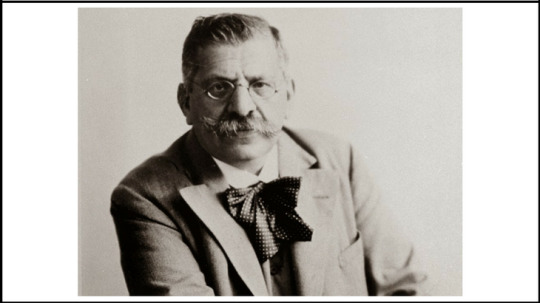
1874 – Adolf Brand (d.1945) was a German writer, individualist anarchist and pioneering campaigner for the acceptance of male bisexuality and homosexuality.
Born in Berlin in 1874, Brand became a school teacher briefly before establishing a publishing firm and producing a German homosexual periodical, Der Eigene (The Own) in 1896. This was the first ongoing homosexual publication in the world, and ran until 1931. The name was taken from writings of egoist philosopher Max Stirner, who had greatly influenced the young Brand, and refers to Stirner's concept of "self-ownership" of the individual. Der Eigene concentrated on cultural and scholarly material, and may have had an average of around 1500 subscribers per issue during its lifetime, although the exact numbers are uncertain. Contributors included Erich Mühsam, Kurt Hiller, John Henry Mackay (under the pseudonym Sagitta) and artists Wilhelm von Gloeden, Fidus and Sascha Schneider. Brand contributed many poems and articles himself. Brand's writings, together with those of other contributors to Der Eigene, aimed at a revival of Greek pederasty as a cultural model for modern homosexuality.
Brand became involved in Magnus Hirschfeld's Scientific-Humanitarian Committee (the first public homosexual rights organization), until there was a split in 1903; that same year Brand led the formation of the Gemeinschaft der Eigenen organisation with the scientist Benedict Friedlaender as principal theorist, and Wilhelm Jansen. To this new group, male-male love, in particular that of an older man for a youth, was viewed as a simple aspect of virile manliness available to all men; they rejected the medical theories of doctors such as Magnus Hirschfeld who found that a gay man was a certain type of person, the intermediate sex.
The GdE was a sort of scouting movement that echoed the warrior creed of Sparta and the ideals of pederasty in Ancient Greece. The GdE was heavily involved with camping and trekking and occasionally practiced nudism - the latter then common as part of the Nacktkultur ('culture of nudity') sweeping Germany.
Long before the advent of the term, Brand was a proponent of "outing" politicians who publicly proclaimed anti-gay positions while privately practicing homosexuality. In 1904, he claimed in print that Friedrich Dasbach, a Center Party Reichstag delegate, consorted with male prostitutes. Dasbach threatened to sue Brand for libel, but they reached an out-of-court settlement. In 1907, Brand claimed in print that German chancellor Prince von Bülow (1849-1929) had a long-standing homosexual relationship with Privy Councilor Max Scheefer. This time Brand was brought to court on libel charges and was sentenced to eighteen months in prison.
Brand was also sentenced to two months in prison in 1905 for publishing allegedly "lewd writings" in Der Eigene. During World War I Brand and the GdE curtailed their activities for the duration; Brand served in the German army for two years and married a nurse, Elise Behrendt. After the war the enforcement of Paragraph 175 slowly declined.
The GdE and other groups formed a united 'action committee' with Magnus Hirschfeld's group, to formulate a new law. In 1925 more groups joined and the larger Cartel for Reform of the Law against Sexual Offenses was formed. Despite a new law being drafted, it was not voted on, and by 1929 there was no further chance to reform Paragraph 175.
Adolf Brand gave up homosexual activism in the early 1930s, after constant harassment from the Nazis who silenced Der Eigene, destroyed his life's work and left him in financial ruin. After the sacking and burning of the Institut für Sexualwissenschaft, he finally sent a public letter to his followers announcing the end of the movement.
He and his wife were killed by an Allied bomb on 2 February 1945. He was 70.

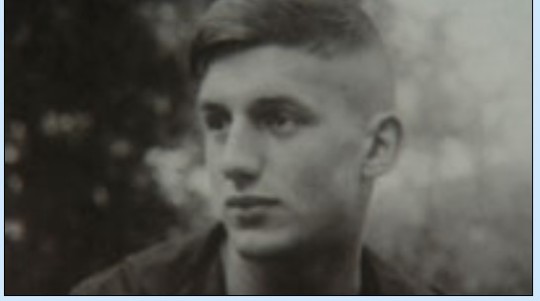
1906 – Albrecht Becker (d.2002) was a production designer, photographer, and actor, who was imprisoned by the Nazi regime for the charge of homosexuality.
Born in Thale, Germany, he trained as a teacher. At eighteen he began a relationship with an older man that lasted ten years. He was an actor and production designer. His partner was the Director of the State Archive in Würzburg. Through this contact he met an array of influential and artistic people. He traveled around the world and developed a lsense of culture and sophistication.
He devoted himself completely to photography. While living in Freiburg and Vienna he showed his first exhibitions and earned his first commissions. He supplemented his income by providing photographs for newspapers and magazines.
Würzburg is a small town in the southern state of Bavaria. Living in Würzburg in the 1930s was a Jewish wine merchant by the name of Dr. Leopold Obermayer. Obermayer apparently complained to the local police department that his mail was being opened. The complaint was investigated by the Gestapo, who took the liberty to search Obermayer's home and discovered a number of photographs of young men in his safe. One of these photographs was of Albrecht Becker. Becker was brought in for questioning in 1935 on suspicion of violating Paragraph 175. Becker reportedly declared: "Everybody knows I'm a homosexual." Both Obermayer and Becker were put on trial. Becker was sentenced to three years in prison at Nürnberg. Obermayer was also convicted of violating Paragraph 175, but as a Jew was sent to Dachau. He was tortured there and sent to Mauthausen, where he died.
Towards the end of the war as the need to replace losses increased Becker was released in order to serve in the Wehrmacht. He served on the Russian front until 1944. Becker spoke of his experiences during the war in the 2000 documentary Paragraph 175.

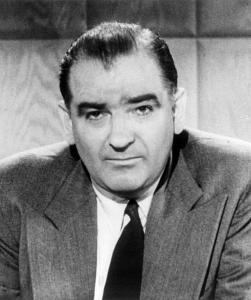
1908 – (Joseph Raymond) Joe McCarthy (d.1957) was an American politician who served as a Republican U.S. Senator from the state of Wisconsin from 1947 until his death in 1957. Beginning in 1950, McCarthy became the most visible public face of a period in which Cold War tensions fueled fears of widespread Communist subversion. He was noted for making claims that there were large numbers of Communists and Soviet spies and sympathizers inside the United States federal government and elsewhere. Homosexuals were particularly suspect of Communistic leanings.
McCarthy made accusations of Communist infiltration into the State Department, the administration of President Harry S. Truman, Voice of America, and the United States Army. He also used charges of communism, communist sympathies, or disloyalty to attack a number of politicians and other individuals inside and outside of government. Thousands of careers and lives were destroyed by his wild accusations
For a time, he was one of the most feared - and hated - men in America.
With the highly publicized Army-McCarthy hearings of 1954, McCarthy's support and popularity began to fade. On December 2, 1954, the Senate voted to censure Senator McCarthy by a vote of 67 to 22, making him one of the few senators ever to be disciplined in this fashion. McCarthy died in Bethesda Naval Hospital on May 2, 1957, at the age of 48. The official cause of death was acute hepatitis; it is widely accepted that this was exacerbated by alcoholism. There is no substance to the rumor the he, himself, was homosexual.
The term McCarthyism, coined in 1950 in reference to McCarthy's practices of demagoguery, baseless defamation, and mudslinging, was soon applied to similar anti-communist activities. Today the term is used more generally in reference to demagogic, reckless, and unsubstantiated accusations, as well as public attacks on the character and/or patriotism of political opponents.

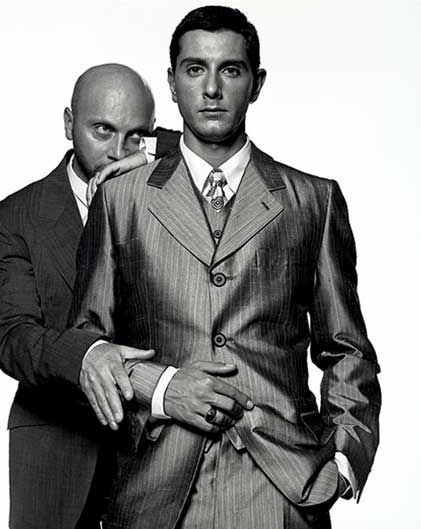
Stefano Gabbana (front) & Domenico Dolce
1962 – Born: Stefano Gabbana, co-founder of the Dolce and Gabbana fashion house, known for their sexy, glamorous women's clothing and sharp men's tailoring, all of which embody a distinctively southern Italian feel. Domenico Dolce's native island of Sicily, a place Gabbana had fallen in love with on holiday, became the bond between the two when they met in the early 1980s, when they worked for the same design studio in Milan.
Stefano Gabbana was born in Milan on November 14, 1962. Initially he went to art school to study graphics but soon transferred to fashion. In 1982 the two men left the design company where they were working when they met to pursue separate consulting careers, but they continued to share an office as well as a private life. After eighteen months, they decided to join forces and the Dolce & Gabbana label was born.
For some 19 years, Domenico Dolce and Stefano Gabbana were partners in life as well as in business. Their personal relationship, which commenced soon after their meeting in the early 1980s, was well documented and they spoke freely about their home life as well as their business partnership in interviews.
Their clothes for men mix the same key elements of sexiness and traditional detail as do their womenswear collections. Just as they put women in "men's clothes," so they mix traditionally masculine elements such as the white singlet (much loved and worn by gay men in the summer of 1995) and pin-striped suits with overtly feminine designs in bright colors.
"It has nothing to do with sexuality or being gay," Dolce told The Guardian Weekend magazine, "It's just that we all have this side ... It's today's society that has made men and women so different. It's good to search inside and discover this small part of the other sex which is inside you."
Dolce & Gabbana's clothes are worn by a whole host of celebrities: Tom Cruise, Brian Ferry, Brad Pitt, Bruce Willis, Isabella Rossellini, Demi Moore, and Nicole Kidman, to name but a few. They are known for donating clothes to and designing for stars they like. To those they do not like, they say "there is a shop."
By far their favorite celebrity is Madonna. "We love Madonna, so anything she asks we say yes, because we love the person, the style, the music--everything." Their admiration for Madonna is fully reciprocated. She is a very big fan of the duo, who are known in America as "the Italian designers"; she acknowledged their place in Italian culture when she stated "Now that Fellini, Rossellini, Pasolini and Visconti are gone, all we have is Dolce & Gabbana's neorealistic fashion."
In February 2005 Dolce and Gabbana broke up as lovers. According to Gabbana, they "had been drifting apart for about five years" prior to the split. The two remain friends and are still working together. Both say that they are committed to the ongoing success of their fashion house and that they plan to remain partners in the business even though they are no longer together as a couple.

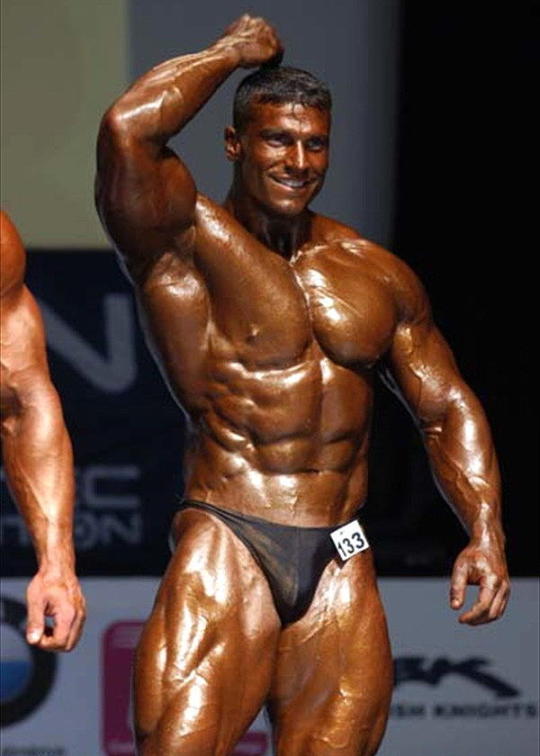
1978 - Zoltan Voros (variously known as Zoltán Vörös, Zolival Vörös and Zoli Vörös) – is a leading Hungarian bodybuilder and occasionally a model. His regular occupation is security guard. Voros’ trainer is László Mazaga. According to both Polish Wikipedia and also the LGBT blog Fabulous Rainbow Stars, he is homosexual. He’s currently one of a few gay bodybuilders in Europe.

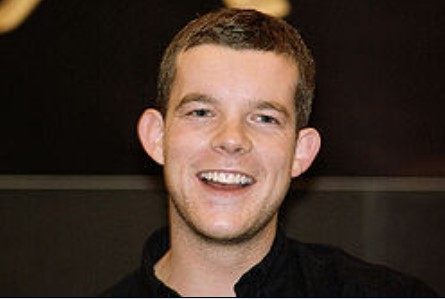
1981 – Russell Tovey is an English actor with numerous television, film and stage credits. Tovey is known for playing the role of werewolf George Sands in the BBC's supernatural drama Being Human which started in 2008. In November 2011, Tovey announced he would be leaving Being Human to work full-time on his BBC Three sitcom, Him & Her. Tovey is also known for his portrayal of the character of Rudge in both the original London and Broadway stage version, and later the film, of The History Boys.
Tovey is gay. He says he came out to himself when he was 15 or 16, and to his parents when he was 18. Tovey and his father had a falling out over Tovey's homosexuality, and his father suggested that, had he known earlier, he would have asked Tovey to take hormones or undergo some other medical treatment to "fix the problem". Tovey says his parents were deeply concerned about the possibility he might contract HIV, which may have contributed to the falling out. The birth of Tovey's nephew in 2005 helped them mend their relationship.
In an interview with The Scotsman, Tovey said,
"The only thing I can give to young gay people is that when I was growing up there were no role models that were blokey, that were men. Everybody was flamboyant and camp, and I remember going, 'That's not me, so even though I think I am gay, I don't think I fit into this world.'"
In 2015, Tovey was the subject of public criticism from the LGBT+ press regarding comments he made about effeminate gay men. In his interview with Tom Lamont of The Observer, the actor stated that his schooling made him feel as though he "had to toughen up", going on to say "If I'd have been able to relax, prance around and sing in the street, I might be a different person now." Much of the criticism centered on what was perceived to be a passive criticism of effeminate gay men, with Tovey saying that "I thank my dad for that, for not allowing me to go down the path." Tovey later apologized for the remarks.
Tovey was reported to be dating rugby coach Steve Brockman from early 2016. They became engaged in February 2018 but separated in June of the same year. They reconciled in August 2019 and, as of 2022, are still together.
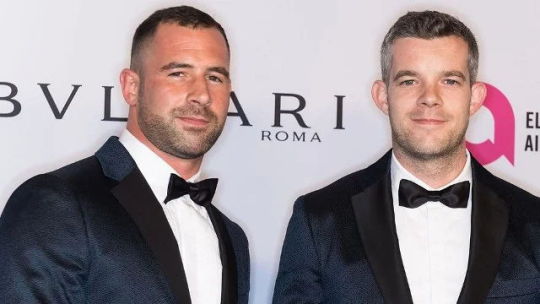
Russell Tovey (R) and Steve Brockmann

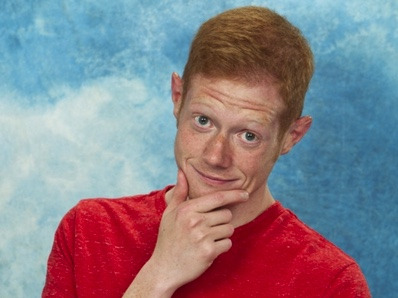
1986 – Andy Herren is an American part-time adjunct professor of public speaking, most notable for winning the fifteenth season of the American reality television show Big Brother 15 (U.S.) in 2013. He is also the first openly gay winner in the show's history.
Andy won Big Brother 15 by a vote of 7-2 on finale night, only not receiving votes from Aaryn and Judd, becoming the first openly gay houseguest to win Big Brother.

1994 – China determines that same-sex acts are no longer to be considered a "social order" offense.


8 notes
·
View notes
Photo

230614 Adolf weibo update
Preheat for Adolf, a brand of shampoos and hair care products~
16 notes
·
View notes
Text

Der Eigene : Ein Blatt für männliche Kultur (ed. Adolf Brand), 1926
Humboldt-Universität zu Berlin
50 notes
·
View notes
Text
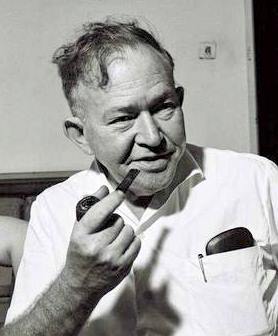
Joel Brand was one of many unsung heroes who smuggled Jews out of Europe during the war. Born in Transylvania in 1906, Brand was raised in Germany and was best known for his efforts to save Hungary's Jews from being deported to Auschwitz. Our reason for posting is to highlight one particular heartbreaking incident : In April 1944, Brand was approached by Adolf Eichmann, the vile Nazi 'Architect of the Holocaust'. Eichmann had a proposal ( We warn you, this does not make for easy reading ). He offered to exchange one million Jews for ten thousand truckloads of coffee, soap, tea and other commodities. Brand then approached both the British and US governments, pleading with them to help him. Both refused, in fact the British Government went even further, jailing Brand to prevent the 'deal' going through. A million Jews who could have been saved went to their deaths in Auschwitz and other camps.There is both a lesson and a warning here for all of us. We're not going to spell it out. We don't think we need to. It's just a gentle reminder to both ourselves and others as to why we do what we do, and why we should never stop.
Likud Herut UK
21 notes
·
View notes
Text

Adolph Weibo update 6.14.2023 Adolf is about to usher in a new brand spokesperson for hair care!
He! A young man that is an actor, a singer and a professional motorcycle racer
12 notes
·
View notes
Text

IN A MINUTE:
A NEW MUSIC ROUNDUP…
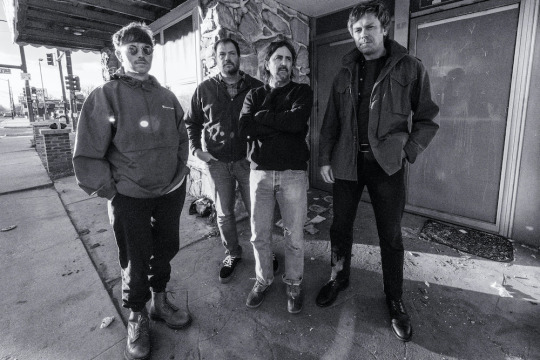
“LET IT GO” is the lead single/track from @americancultureofficial’s forthcoming LP titled ‘Hey Brother, It’s Been a While’ (5/3 @convulserecords ) & it finds the Denver-based quartet of Chris Adolf (guitar/lyrics/vox), Lucas Johannes (bass/guitar/organs), Michael Stein (guitars/lyrics/vox), & Scott Beck (drums/keys) linking up w/ fellow Coloradan @mercury_tracer to live that “C86ers that sound nothing like c86” lyfe across 5+ weary ass mins of mad_chestering meets college_radio_ing JanglePop.

@_fonteyn_ is here w/ a brand new standalone single titled “JODY” (@bornlosersrecords) & it finds the Salt Lake City-based UK native bringing 3 classically timeless mins of beautifully bewitching, warmly wholesome & richly retrofitted IndiePop.

@frailbodyil are here w/ “DEVOTION,” the second single from their forthcoming LP titled ‘Artificial Bouquet’ (3/29 @deathwishinc) & it finds the Rockford-based trio of Lowell Shaffer (guitar/vox/keys), Nic Kuczynski (bass) & Nicholas Clemenson (drums) witnessing a loved one “coming to terms that their religious beliefs weren’t going to save them from their fate” across 6+ breathy mins of start/stopping RealScreamO.
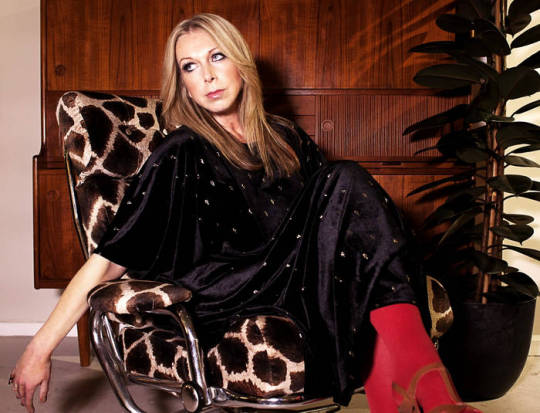
“ROMANTIC WORLDS” is the latest single from @janeweavermusic’s forthcoming LP titled ‘Love In Constant Spectacle’ (4/5 @fire_records) & it finds the Liverpool-based artist “abusing, evading & obliterating” her way across a 3:52 clip of whimsically awash & retro-tinged PsychPop.

“A MATTER OF TACT” is the second single from @profitprison’s forthcoming debut LP ‘Gilt’ (4/26 @avant_records) & it finds producer Parker Lautenschlager’s Seattle-based project giving us exactly what we need across 3 ½ buzzy mins of throbbingly tactile & dark_disco_ing SynthPop.
#music#screamingforyears#songs#ts4 screenshots#postpunk#indie#rock#indierock#goth#aesthetic#alternative#synthpop#newwave#darkwave#electronicmusic#Spotify#Bandcamp
2 notes
·
View notes
Text
wang yibo - adolf haircare vcr
wyb: Hello~ everyone, I am Wang Yibo, the spokesperson of Adolf shampoo and hair care brand. How to relax in a busy life Adolf Emotional Fragrance Heart Joy Bottle The natural fragrance is pleasant and relaxation begins with every strand of hair. Come to the Adolf flagship store on Tmall and experience Adolf natural fragrance shampoo and care with me. There are more surprise gift boxes waiting for you to open.
21 notes
·
View notes
Note
Crypto-terf anon here again, and yes, lol, those are exactly the people I was talking about. Those accounts feel so insidious because on the surface they seem to pay lip service to a lot of complaints a lot of progressives share (I have definitely seen some of my own frustrations about infighting and, like, harassment as praxis reflected in them), and their whole deal seems to be geared around coalition building and wanting to create, like, a kinder and gentler left. Which seems great on the surface, but then consistently their whole brand keeps being linked to this genteel transphobia and I'm like...uh, never mind.
I admittedly haven't seen any explicitly anti-trans stuff from Morrigan specifically but she seems more than happy to kick it with the ones who traffic in it, so...yeah.
yeah she's said very explicitly on her podcast that she wants to create a space where "trans women and terfs can interact with one another" . and its like maam. you think they can just have rational debate about whether or not one of the two of them is a human being??? i fully think she's just like super ignorant and erected an entire political identity around the fact people don't like someone she's dating or that she tried to sell some zines during the height of the 2020 uprising and literally doesnt understand enough about any of the waters she's wading into to not show her ass. shes managed to spend going on four years running this grift without ever learning a damn thing about any of it because if she did the worldview would fall apart
like. her and her partner are constantly falling back on adolf reed as this like anti identitarian Black communist figure and its like. that man has published some egregiously transmisogynistic things so dont act like he's absolving you of seeming problematic or ill conceived. it just makes you look like you havent read anything when you claim him like that. its soooo gross and transparent
and now some of the others in their circle post this awful stuff about how they wish we had more defined gender roles because what does womanhood even really mean right now. classic like post leftist catholic reactionary stuff.
but nobodys worse or more explicit with the transmisogyny in all this than seerut. and yeah just generally i think its important to point out for the most part its transmisogyny very specifically. tho some other people in their circle like he valencia do post some generically transphobic takes that are just awful
12 notes
·
View notes
Text
Eye Opening Concept of "The Great Dictator" And Chaplins Portrayl as one of the most Notorious Leaders
Dante Calabrese
This week, I saw the Charlie Chaplin film The Great Dictator, which has a lot of anti-Nazi overtones. It also relates to Dorothy B. Jones' book The Hollywood War Film: 1942–1944. In this passage, it is discussed how World War II-era movies portrayed the conflict and the issues they explored. Since not every nation participated in the war, the reading also touches on how the conflict has been misrepresented in movies.
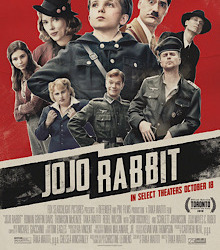
There are numerous examples of anti-Nazi undertones in Charlie Chaplin's 1940 film The Great Dictator. Charlie Chaplin portrays two characters: Adenoid Hynkel, a mocking allusion to Adolf Hitler, and a Jewish barber. The story alternates between the lives of Hynkel and the Barber giving off a two story plot connected into one entire story alone. In the text of the book a quote by Jones, she states “During 1942 and 1943 the quality of home-front stories was consistently low. In most films, such activities were given a comedy treatment.” Another ideal quote from the text emphasising the connection with the film plot very well is “As a whole, they tended to stereotype them as the usual gangster “heavy,” identifiable by the fact that he either “heils Hitler” and speaks with a guttural German accent, or has slant eyes and hisses his “s’s””. Its very intersting the how this quote shows great emphasis and description of how Chaplin's acting and the other supporting cast portray these Nazis acting in the film. What this film does at the end of the day when taking in all of it is that a famous actor Chaplin himself took his artistic skills of turning one of the most horrible and dealiest Genocides by making it into a dark humor comedy as a means to help people digest this horrific realife events but at the same time spinning it into a new twist that the Holocaust had to endure, almost a means of coping with this. While excellent in the role, Chaplin also adds his own brand of humor by essentially making fun of himself. He conveys the idea that the guy he is playing, who is perceived by the Germans to be an all-powerful and idolized person, is actually just a horrible and stupid person by using his facial expressions and even stumbling over his sentences. He takes the oppertunity to mock humiliate Hitler and showing him as fool. Lastly Ironically history would repeat itself with the hollywood film industry with another film taking the same extent of comdey and foolishnes making fun of Hitler was the 2019 film, "JoJo Rabbit" with the director taking on the same role as Chaplin did being Hitler. The story follows as so, Jojo is a lonely German boy who discovers that his single mother is hiding a Jewish girl in their attic. Aided only by his imaginary friend -- Adolf Hitler Jojo must confront his blind nationalism as World War II continues to rage on.
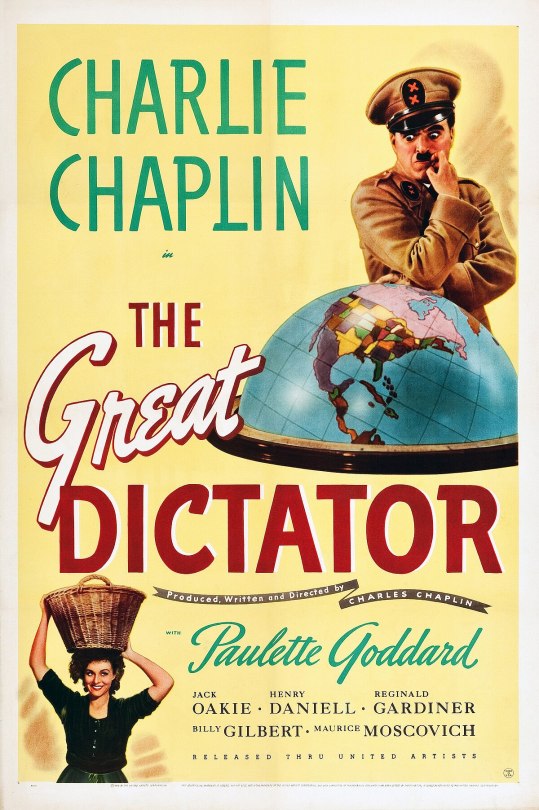
Reference
Jones, Dorothy B. “The Hollywood War Film: 1942-1944.” University of California Press, University of California Press, 1 Oct. 1945, online.ucpress.edu/fq/article-abstract/1/1/1/37212/The-Hollywood-War-Film-1942-1944?redirectedFrom=fulltext.
3 notes
·
View notes
Text
By: Wilfred Reilly
Published: May 18, 2023
There has been a good deal of talk in the US over the past few weeks about ‘Hispanic white supremacy’. The idea itself sounds darkly funny, but its widespread prominence says something serious about the mainstream media’s embrace of race essentialism.
The recent prompt for all this talk was the mass shooting at an upscale outlet mall in Allen, Texas, on 6 May. Nine people were killed, including the perpetrator, and another seven were badly injured. Almost immediately, the national media looked beyond the tragic reality of the murders themselves to focus on right-wing activism and, more specifically, on white supremacy.
The Washington Post’s first social-media post addressing the shooting read: ‘The gunman who opened fire on an outlet mall in a Dallas suburb… was a man in his early 30s who may have had white-supremacist or neo-Nazi beliefs.’ Meanwhile, Salon seems to have simply assumed that the shooter was a white supremacist, asking in a headline: ‘When a mass shooter is a white supremacist. Does it even matter?’ The UK-based Independent similarly honed in on a potential white-supremacist motive, running a long piece on the gunman’s ‘white-supremacist social-media footprint’.
One important detail was rarely mentioned, however – namely, that the Allen mall shooter, Mauricio Martinez Garcia, was actually Hispanic.
Yes, it is true that Garcia displayed a fondness for elements of the radical right. He was active on 4chan-style websites, like the obscure Russian platform ok.ru, where he posted photographs of swastika tattoos, ‘praise for Adolf Hitler’, a range of incel gibberish, and – perhaps unsurprisingly – ‘complaints about the state of his mental health’.
However, Garcia does not seem to have dreamed of an all-white society (which he would presumably be excluded from). His rambling writings suggest that he actually believed Latin Americans to be the planet’s superior race. Nevertheless, several major publications tried to square the circle by running headlines like the Nation’s unforgettable ‘White supremacists don’t have to be white’.
The media line that this pro-Latino Hispanic lunatic was actually a white supremacist would simply be a curiosity if this were an isolated example. But it isn’t. In fact, a growing number of right-wing ethnic minorities are now finding themselves accused of believing in ‘white supremacy’. Take, for example, the attacks against Larry Elder, the popular black conservative radio personality. During Elder’s Californian gubernatorial campaign in 2021, the LA Times referred to him as ‘the black face of white supremacy’.
What do these accusations mean in practice? At the root of ideas like black or Hispanic white supremacy is an essentialist view of race. Many wokes and even liberals now believe that different races are immutably linked to specific cultural traits. Within this rather insidious framing, racism and conservatism are said to be ‘white’ traits, and so black racists or even just black conservatives must therefore be ‘white’, too.
This is no exaggeration. In 2020, the Smithsonian Institution’s National Museum of African-American History and Culture published a list of what some prominent staffers considered to be distinctive ‘white’ traits. Among them were a stable ‘family structure’, ‘objective, rational… thinking’, the belief that ‘hard work is the key to success’ and showing up on time for work.
Similarly, more than a few American liberals appear to believe that academic performance is a proxy for whiteness. A past column of mine for spiked dealt with a novel technique devised by at least one major US school district. To explain the high academic performance of ‘oppressed’ Asian and West African students, the school district simply labelled these overachieving ethnic-minority students as ‘white’.
This sort of essentialism is remarkably racist. It implies, for example, that being hard-working, or being objective and rational, are natural predispositions for whites, but not for blacks. Such claims are nonsensical and dangerous. Believing that certain characteristics or traits automatically attach to members of any racial group is the very definition of racism. Some members of minority groups can be radicalised to the political right, but the fact that they are right-leaning criminals or terrorists does not make them white. Acts of violence committed by black or Hispanic people that have a racial component – the Waukesha Christmas parade attack comes to mind – must be understood for what they are. They should not be ignored or shoehorned into a box that does not fit them.
More broadly, it is important to recall that people do not behave as they do because of their race. Mass shooters kill people mostly because they, specifically, are disturbed. And immigrant kids do well in school not because they are acting ‘white’, but because they tend to study hard. When analysing people at either of these extremes or in between, it’s generally a good idea to put aside the labels and focus on that smallest of minorities – the individual. Otherwise, we risk reviving a very ugly and divisive form of racial thinking.
==
“Another aspect of the construction of whiteness is the way certain groups have moved into or out of that race. For example, early in our history Irish, Jews, and Italians were considered nonwhite—that is, on a par with African Americans. Over time, they earned the prerogatives and social standing of whites by a process that included joining labor unions, swearing fealty to the Democratic Party, and acquiring wealth, sometimes by illegal or underground means. Whiteness, it turns out, is not only valuable; it is shifting and malleable.”
-- Delgado/Stefancic, "Critical Race Theory: An Introduction (Third Edition)"
“Reflecting on the social and economic advantages of Whiteness, critical race scholar Cheryl Harris (1993) coined the phrase “Whiteness as property.” This phrase captures the reality that being perceived as White carries more than a mere racial classification. It is a social and institutional status and identity imbued with legal, political, economic, and social rights and privileges that are denied to others.”
-- Sensoy/DiAngelo, "Is Everyone Really Equal?"
Critical Race Theory regards "whiteness" as property. Not simply in the "helium has the property of low density, high thermal conductivity" sense. But in the sense of an exclusive club you can be either born into or buy your way into, like a country club. In effect, it means someone can be disavowed as a "sellout" ("acting white," "race traitor," "internalized racism"), who sucked up to the members to gain their favor and admittance to the club. Because race essentialism, as Reilly touched upon.
#Wilfred Reilly#white supremacy#whiteness#aspects of whiteness#race essentialism#neoracism#antiracism#antiracism as religion#woke#cult of woke#wokeness#wokeness as religion#wokeism#religion is a mental illness
7 notes
·
View notes